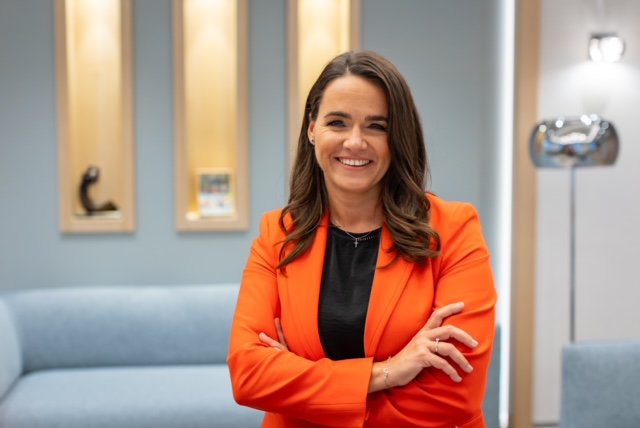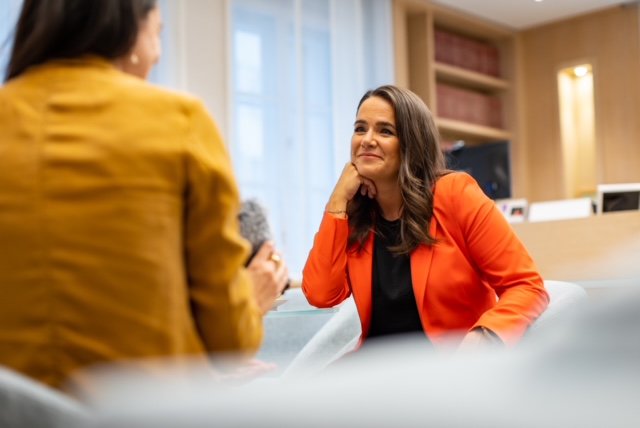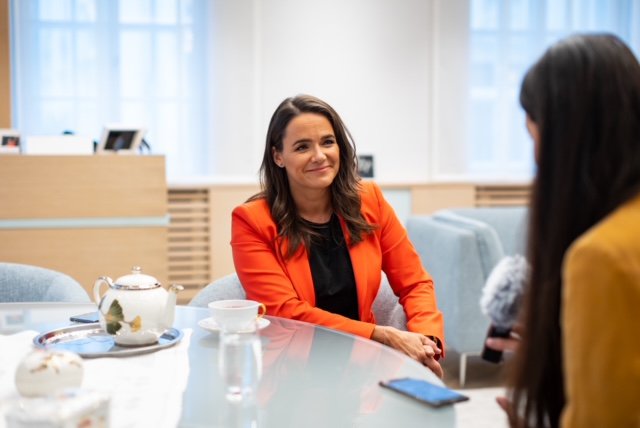Personal faith gives her life a framework and meaning. Although she started daily Bible reading as an adult, she now finds it unimaginable to start the day without it. Katalin Novák, Minister of Family Affairs, has been the Goodwill Ambassador of the Hungarian Reformed Church Aid (HRCA) since September. In an interview with reformatus.hu, she spoke about her new mandate, her personal relationship with God and her family.
"We should not deny that despite the country's achievements in family policy, there are still poor, needy and disadvantaged people. These people are not usually noticed by politicians, but Katalin Novák is able to see them," said Bishop Zoltán Balog, ministerial president of the Synod of RCH in his eulogy when you were awarded the ‘Milotai Nyilas István Prize’ in September. Where do you see deprivation?
You don't have to look far to see in how many places help is needed, and therefore we have an obligation to help. We learned from our grandparents to always have an eye for the needy in our human relations, partly because this is how we can appreciate what we have been given. We will always find someone in a worse situation than us. If we recognize this, we will also gain the strength to help. I am grateful to God that our family has the strength and the opportunity to listen to those who are struggling, and I am also grateful that as a minister I can do this through my work. That is why I have accepted with a good heart the call of the Hungarian Reformed Church Aid. Many of the HRCA's programs are widely known, but there are initiatives that are less visible to the majority of the people. They help children start the school year, and they also offer support in many areas, from the Rescue Bear program and donating firewood to supporting the work of the Bethesda Children's Hospital of RCH. Now I have been given the opportunity to contribute to their service.

Katalin Novák, minister of state for family affairs, goodwill ambassador of the Hungarian Reformed Church Aid
What is your experience, how far do we recognize people in difficult situations?
I have observed two parallel phenomena. On the one hand, there are those who constantly talk about how many people live in poverty in Hungary. They often make exaggerated statements that are out of touch with reality, for example that millions of people are starving in the country. This is not true! In most cases, these statements remain at the level of slogans and scaremongering, without any action to help. On the other side, I see love in action, care, which often takes place out of the spotlight, but moves a lot of people. It is surprising to observe that many people are concerned about starving children in Africa and want to help them, but do not feel the urge to volunteer e.g. in a Roma camp in Borsod county, in the Eastern part of the country. Of course, helping African children is also a noble task, but I am convinced that we must offer help first at home. If there are gypsy settlements in Hungary where many children do not have shoes or warm clothes, we have a lot to do in our home country. I have often visited barefoot children living in poor conditions. Although it is now possible, thanks to government support, that no child should be hungry, the fact is that there are still families who live in severe deprivation. We have obligations toward them. And first and foremost, we have to deal with them here, in Hungary, and among Hungarians living across the border, in the Carpathian Basin.
What is the added value of offering help as Christians?
At least once in a lifetime, everyone ask themselves who they really are. I am a reformed Hungarian Christian, a child, a parent, a wife, a sister. This is my identity. When we can articulate who we are, we find points of orientation, ‘landmarks’ that simplify our lives and make our decisions easier. To be a Christian is a responsibility and a certainty at the same time. Christians know that they have a duty and, at best, they also recognize where and toward whom they owe this obligation. As Christians we have a responsibility for our fellow Christians, and as Hungarians we have a responsibility for our fellow countrymen.
You speak with conviction of this identity, of Christianity as point of reference, which can also facilitate decision-making. Where did you find this fundamental certainty?
I am a person constantly seeking to deepen my faith. Our family belongs to the congregation in Hold Street, Budapest (the German speaking reformed congregation), where I also attend a group which meets every second week with the aim of deepening faith. During these meetings we have the opportunity to discuss Bible passages, ask questions about our faith together and seek answers to them. Alongside the certainty of faith, there is also a constant desire to deepen our faith. And as for my personal motivation, apart from the spiritual aspect, I try to draw on the example of my grandparents. They had a life full of tribulations, but they lived in a loving marriage until their deaths, just as our parents have stood by each other in love for decades. This is an example for my brother and me to follow. It was not difficult for us when we looked for role models. Of course, realising that we don't need another way and it is enough to follow the same path as those who have gone before us, is just as difficult as finding a new path.

"I'm a person constatntly seeking to deepen my faith"
As Minister for Family Affairs, you deal a lot with the issue of housing and homemaking. What does home mean to you?
For me, home is a place where I am surrounded by goodwill, where I can be myself, where I don't have to play any role or hide behind a mask.
Do you have a spiritual home?
I am at home in my local congregation, but it is a liberating experience that I don't always need a church to be communion with God. One day, after an important conversation that led to a pivotal decision for me, I felt something happen to me that was far beyond me. I am not receiving it because I deserve it, but out of grace. When I left that meeting, my first instinctive reaction was the deep wish to give thanks, to go to church, but I didn't have the opportunity to do so. And I knew that I could be with Jesus Christ whenever and wherever I wanted to, so I simply parked the car and started praying in a park. It was a liberating feeling.
With the heavy schedule of a minister of state, I suppose there is not always time to be on your own.
Indeed, this is true, but let me add that the need for privacy has never been an excuse for me not to go to church on Sundays whenever I could. The importance of worshipping in community, by the way, is something I really understood during the pandemic. Although there was quality online coverage and we tried to attend worship virtually with the children on Sundays, I admit that after a few months, there were times when the soup was boiling during the worship, or we got distracted otherwise. Whenever I go and attend a worship, I come away richer in spirit than when I arrived. Most of the time this is due to the sermon itself, but sometimes the experience of the fellowship in the congregation reveals me insights that I would not have realized if I had not gone to church that day.
István Milotai Nyilas (1571-1623), reformed Bishop and court chaplain to Prince Gábor Bethlen, eponym of the aforementioned award, was one of the most prominent figures in Reformed education in the early 17th century. He did much to ensure that Reformed colleges were run to a high standard. Your children go to Reformed schools. What is your experience of church education?
All three of our children go to the Baár-Madas Reformed Primary and Secondary School. They spent their elementary school years in a state school. The quality of education is excellent in both places, but here they receive a surplus in terms of spirituality. It meant a lot for me, as a parent, for example, that during the Pandemic, the letters from the director and class teacher always contained a verse from the Bible in addition to the current information. It is also good to see that the children start every week with a common worship and every day with a common reflection, so that the presence of God becomes part of their lives almost as a matter of course. I became a daily reader of the Bible as an adult. It wasn't easy to fit it into my life, but now I would miss it a lot. My hope is that our children, who receive daily spiritual orientation, will keep this practice and know where to turn whenever their ‘spiritual’ hunger awakens. It is good to see our 18 year old son competing with his friends to see who knows which psalm, among many other boyish activities, of course. One time the story about the encounter of Zacchaeus and Jesus came up at home. I begin summarizing the story to the children and the response was; ‘but mummy, everyone knows the story of Zacchaeus!’ Then I thought how good it is that they take it for granted, how good it is that they think everyone really knows how Zacchaeus descended from the fig tree. It's also interesting to observe that in their milieu, it's not extraordinary to live in a large family or to go to church, it's almost exceptional that they are only three siblings, not four or five or more.

As Christians, we often refer to God's love and guidance. To what extent do you experience this love and encouragement in your everyday life, even though as a politician you must be facing a lot of critique?
Since I have been in public office, the relevance and meaning of the Lord's Prayer has changed. At the end of the prayer we say "for thine is the kingdom, the power and the glory", but often the emphasis is on the words "kingdom", "power" and "glory" when it should be on "thine". Every time I recite the Lord's Prayer, this is the moment where I realize that the kingdom, the power and the glory are not mine, not ours, but God's. It is also clear from the sentence that power, office and mandate are given by grace. This insight gives me strength, energy, a real sense of security. I know that the Kingdom belongs to God, but this does not make me inactive, rather liberates me, because I have the opportunity to participate as a servant in His realm. This makes my work and my life meaningful.
Originally published in Reformátusok Lapja, the Weekly Magazine of RCH. Translated by András Bence Szabó.